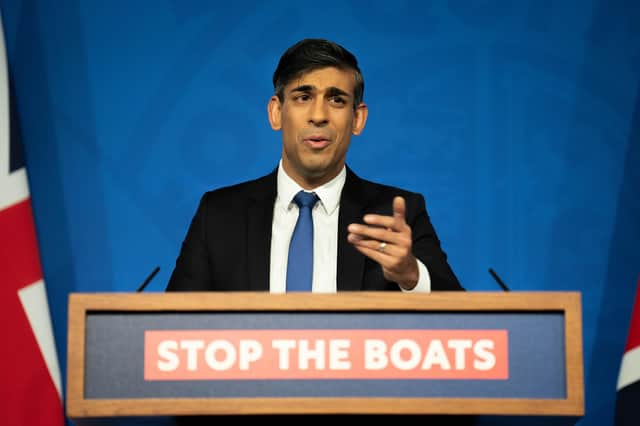Jane Bradley: How can Rishi Sunak celebrate his Rwanda bill as less wealthy nations welcome refugees?


The passing of Rishi Sunak’s Rwanda bill through parliament sent a clear message to refugees across the world: “We do not want you”.
His government’s plan, to ship asylum seekers arriving on British soil to Rwanda for their claims to be processed – and then not allow them back into the UK – is, he insists, borne out of necessity.
Advertisement
Hide AdAdvertisement
Hide Ad"The British people should decide who gets to come to this country – not criminal gangs or foreign courts,” he tweeted, after he staved off a Tory rebellion to have his amended agreementThree passed by 44 votes.
"We will now work to make it law so that we can get flights going to Rwanda and stop the boats.”
As he celebrated his victory, delegates from countries across the world – including those who have a far larger proportion of refugees than the UK – gathered in Switzerland to discuss their own countries’ situation. I hope he feels ashamed.
Hosted by UNHCR, the United Nations’ refugee agency and held every four years, the Global Refugee Forum is the world’s largest international gathering on refugee issues.
Official figures show that 75 per cent of the world’s 114 million refugees are hosted by countries with middle or low incomes, while the United Nations recently warned that this year, it had only received about a third of the international funding it had asked for.
This will not have been helped by the UK’s cuts to its aid budget.
In 2020, an emergency measure brought in to help meet Covid costs saw the amount donated internationally slashed from 0.7 per cent to 0.5 per cent of Gross National Income, with the figure not set to be increased again for at least another three years from now.
Robinah Nabbanja, the Ugandan prime minister, explained how her country had gone from being a major refugee country of origin in the 1980s, to today having the fourth-largest refugee population globally, hosting people who have fled from South Sudan, the Democratic Republic of the Congo, Somalia and Burundi, among others.
Advertisement
Hide AdAdvertisement
Hide Ad“These are our African brothers and sisters, who find themselves victims of sectarian conflicts,” she said. “Accepting African refugees is part of [our] solidarity with our African brothers and sisters.
However, she had a message for countries with more financial resources than Uganda, which has a 41.7 per cent poverty rate and a GDP per capita of around 45 times less less than the UK.
“Enormous strain has been placed on our meagre economic resources,” she said. “Refugees come with critical needs that must be addressed by all concerned stakeholders. They should not be left to host countries.”
In Jordan, which hosts nearly four million refugees of different nationalities - a third of the country’s 11 million population – King Abdullah II summed it up even more succinctly.
"We cannot turn our backs on refugees, because that is who we are,” he said. “But Jordanians have been increasingly feeling that the world is turning its backs on them, as refugee hosts.”
Perhaps tellingly, at the time of writing, the UK Government had not yet issued a statement to the forum.
I’m intrigued to hear what they have to say.
Comments
Want to join the conversation? Please or to comment on this article.
